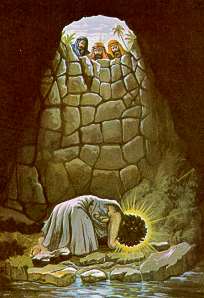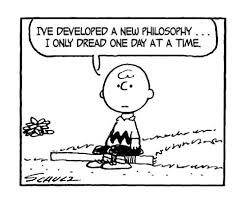Background Passage: Joshua 1:1-9
I walked on stage this year again as a part of yet another high school graduation. After a 30-year career in public education, I’ve participated in one form or another in more than 120 commencement exercises and watched roughly 65,000 young people end their high school careers. That means I’ve seen my share of beach balls. Heard my share of air horns. Watched my share of impromptu dances across the stage.
The faces of these graduates as they received that cherished piece of parchment paper reflected a mixture of joy and excitement, tinged with an underlying sense of dread. Each of them undoubtedly realized in the hours after they walked the stage that they faced a future that remained largely unknown despite all their plans and dreams.
As I watched the evenings unfold each year, the ceremony always reminded me of my own graduation from high school. The scope and venue were certainly different. NRG Stadium in Houston compared to my high school auditorium in Ropesville. Standing among classes ranging in size from 450 to 900 students compared to my class of 33.
The graduation ceremonies, regardless of time, place and size, mean the same today as they did in our yesterday. Each graduate ends that which is familiar to begin a future that will unfold before them in unexpected ways, taking them down paths beyond anything they can truly imagine. It will be confusing and chaotic. Exciting and exhilarating. Filled with joy and pain. Some will thrive amid the challenges of life. Others will wither under its pressure.
So, we watch these young people graduate from high school with a prayer on our lips and hope in our hearts that God will lead, guide and protect them through each day of their lives. I am certain, whether they know it or not, they will need his presence every step of the way.
Our culture calls it commencement. A beginning. I like to think of it as a commissioning. A challenge set before them to be all God needs them to be in whatever call of life he sets before them.
He faithfully served his God under the leadership of Moses. Chosen among the leaders of his tribe to sit among Moses’ council of advisors, Joshua played a significant role in leading the Hebrew people into the promised land. As a spy, Joshua refused to see the land of Canaan as a place of unconquerable giants and impenetrable fortress cities as others did. Rather, Joshua saw the land God promised as a land of milk and honey.
Because of his trust and faith in God, Joshua was given the task originally assigned to Moses. I picture him standing ankle deep in the slow current of the River Jordan, staring across the valley in the direction of Jericho. It is three days before he would give the command to his people to cross the river and enter the land of promise.
If he was anything like most of us, and I suspect he was, he fought an internal battle with his doubts and fears, voicing a prayer for strength and wisdom he did not feel. Joshua surely understood his future would be at times confusing and chaotic. Exciting and exhilarating. Filled with joy and pain. A future in which he could thrive amid the challenges and stumble under the pressure. Like our graduates today, I suspect the butterflies in Joshua’s stomach seemed as large as eagles.
God chose that moment as his commencement. His commissioning. The Old Testament tells us that God gave his charge to the leader of his people as he stood with his toes in the Jordan. As a commission to those he calls to serve it can encourage our graduates equally well as they prepare to encounter life after high school. And, it is good news indeed.
God said to Joshua…
“Be strong and very courageous. Obey the laws Moses gave you. Do not turn away from them and you will be successful in everything you do. Study this book of the Law continually. Meditate on it day and night so you may be sure to obey all that is written in it. Only then will you succeed. I command you…be strong and courageous! Do not be afraid or discouraged. For the Lord you God is with you wherever you go.” (Joshua 1:7-9)
To our graduates know that God has a purpose for your life, just as he did when he told Joshua, “You will lead my people to possess all the land I promised to give their ancestors.” His plan is unique to you, to the heart he has given you, the skill sets you have learned and the talents you acquire along the way. I can almost guarantee you the plan will take you places you never thought you’d go. Watch for the doors that open and don’t hesitate to walk through them.
Following God’s path will not always be easy. Life will hit with cold reality that will lead to disappointment and discouragement. Yet it will also bless in glorious ways. God encouraged Joshua to “be strong and very courageous.” The door he opens may not be the threshold you wanted to cross. Step through it anyway with courage, conviction and confidence in the Father. The door may appear to be blocked. Overcome. Persevere and rest on the promises of God.
God reminds us in this passage that success is contingent on our understanding of and obedience to the word of God. We leave high school and home desiring to exert our personal independence, to make our own choices and chart our own course in life. That’s the whole point of growing up.
Free of someone who wakes you on Sunday morning for church, it will be easy to sleep in…to set aside your faith. A word of caution. Now is not the time to express your independence from God. As you enter college or head into the work force to establish a home of your own, you will choose whether to abandon the relationship you have with Christ or to draw more deeply upon it. You have that choice.
God reminded Joshua not to stray from the teachings of God. To hold the word of God close to his heart. To meditate upon it. To study it. To draw from scripture the wisdom of God that enables us to deal with both the good and difficult times of life. This is the key to success.
Be careful also to recognize success through the eyes of God and not the eyes of the world. Success hinges upon your ability to stay focused and obedient to the plan God has for you. When we walk in his steps we walk on firm ground, able to experience joy and contentment in a life of service to the Father and to others.
As you can imagine and as the scripture tells us, Joshua and his people had to fight for all that God promised. The path God chose for Joshua was not easy. The hardships and heartaches were real. The difficulties must have seemed insurmountable at times where Joshua struggled with which way to turn and what he should do. He must have felt terribly alone at times.
You will almost certainly face hardships and heartaches throughout your life, hopefully in the measured grace of God’s blessings. You will face some of life’s hardest decisions, uncertain about which way to turn and what you should do.
Know this. God promised his presence. “…the Lord your God is with you wherever you go.” It is a promise as true today as it was when Joshua stood with his toes in the Jordan River. Trust the promise. Trust in the one who made it. God will be with you wherever you go.
So the message of Joshua speaks these four things as clearly to me today as it should to you as a high school graduate.
God has a plan and purpose for each of us…in every phase of life.
He calls us to walk with strength and courage in obedience to his plan and purpose regardless of where it leads us.
We find that strength and courage and discover his will and wisdom only when we seek him and immerse ourselves in his word.
Despite the difficulties that will most assuredly come, we can rest each day knowing that he will be with us wherever we go.
Here’s the thing I’ve learned and the one of which I am reminded with every graduation I attend. The challenge of graduation isn’t a one-time event. After you’ve tossed the cap and hung the tassel from the mirror of your car, you will take the next step in the life God has planned for you. You will dip your toes in the Jordan and step into the land he has promised. From that day forward, you will find another Jordan to cross. And another. And another. And another.
To every graduate out there, whether with the Class of 2017 or any class back through time, celebrate this special day. When it is over, dip your toes in the Jordan. You can’t imagine what God has planned for you!










